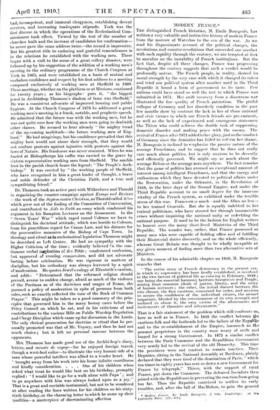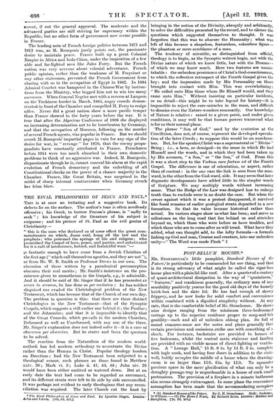MODERN FRANCE.*
The distinguished French historian, M. Emile Bourgeois, has written a very valuable and instructive history of modern France from the morrow of Waterloo to the eve of the war. As wo read his dispassionate account of the political changes, the revolutions and counter-revolutions that succeeded one another with such rapidity through the century, we are tempted at first to moralize on the instability of French institutions. But the fact that, despite all these changes, France was progressing throughout the century suggests that such a verdict would be profoundly untrue. The French people, in reality, showed its moral strength by the very ease with which it changed its rulers and tried one political system after another until in the Third Republic it found a form of government to its taste. Few nations could have stood so well the test to which France was submitted in 1871. Her swift recovery from a disastrous war illustrated the fine quality of French patriotism. The pitiful collapse of Germany and her disorderly condition in the past few months show by contrast the lack in her of those national and civic virtues in which our French friends are pre.eminent, as well as the lack of experienced and courageous statesmen like Thiere who could achieve the double task of suppressing domestic disorder and making peace with the enemy. The revival of France aftir 1871 added to her glory, just as the conduct of Germany since the Armistice has failed to redeem her shame. M. Bourgeois is inclined to emphasize the passive nature of the average Frenchman, and to suggest that he does not really care much about politics, but is only anxious to be decently and efficiently governed. We might say as much about the average Briton or the average man anywhere. The fact remains that the game of politics has aroused an exceptional amount of interest-among intelligent Frenchmen, and that the energy and enthusiasm which they have devoted to political affairs under the Restoration, under the Orleanist, in the Revolution of 1848, in the later days of the Second Empire, and under the Third Republic account to no small degree for the immense vitality of the French system, as exhibited under the terrible stress of this war. France ow,s much—and the Allies no less— to her trained Generals. But she is equally indebted to her trained politicians, who have steered her through innumerable crises without impairing the national unity or enfeebling the national purpose. It used to be the fashion for English writers to lament over the many short-lived Ministries of the Third Republic. The wonder was, rather, that France possessed so many men who were capable of holding office and of fulfilling their Ministerial duties discreetly, and on the whole efficiently, whereas Great Britain was thought to be wholly incapable at any given moment of finding more than two alternative sets of Ministers.
In the course of his admirable chapter on 1848, M. Bourgeois remarks that
"The entire story of French democracy in the present era, in which its supremacy has been finally established, is involved in the two factors of political life as existing in February, 1848 ; one being the essential harmony between bourgeoisie and People, arising from common ideals of justice, liberty, and the unity of human interests ; the other, the initial discord between the two classes, the first cautious, concerned for order, and anxious to secure the confidence of the individual citizen, the second impatient, blinded by the consciousness of its own strength and inclined to abuse it, the easy victim of the allurements and incitements of theorists and adventurers."
That is a fair statement of the problem which still confronts us, here as well as in France. In 1848 the conflict between the cautious folk and the hotheads led to the failure of the Republic and to the re-establishment of the Empire, inasmuch as the peasant proprietors in the country were weary of strife and longed for a strong Government. In 1871 a similar conflict between the Paris Commune and the Republican Government very nearly led to the revival of the old Monarchy. This time the provinces were not content to remain inactive. Their Deputies, sitting in the National Assembly at Bordeaux, plainly declared that they were tired of the domination of Paris, " which ten times in eighty years has sent us down a new Government for France by telegtsph." Thiers, with the support of rural France, put down the Commune. The defeated Socialists then joined with the Republicans in preventing the reaction from going too far. Thus the Republic contrived to outlive its early troubles, and, after the fall of MacMahon, to gain the general • .Ifisfeta Frau,. ne Emile Boulfrola. 2 rota. Cambridge: at lnlretery lice. RI.. 50.1
assent, if not the general approval. The moderate and the advanced parties are still striving for supremacy within the Republic, but no other form of government now seems possible in France.
The leading note of French foreign politics between 1871 and 1913 was,. as M. Bourgeois justly points out, the passionate desire to maintain peace. France built up a great Colonial Empire in Africa and Indo-China, under the inspiration of a few able and far-sighted men like Jules Ferry. But the French nation was very nervous about colonial adventures. French public opinion, rather than the weakness of M. Freycinet or any other statesman, prevented the French Government from sharing with us in the occupathin of Egypt in 1882. In 1884 Admiral Courbet was hampered in the Chinese War by instruc- tions from the Ministry, who begged him not to win too many. successes. When General Negrier met with a reverse at Langson on the Tonkinese border in March, 1885, angry crowds demon- strated in front of the Chamber and compelled M. Ferry to resign office. Never did a great nation show a more pacific temper than France showed in the forty years before the war. It is true that after the Algeciras Conference of 1906 she displayed_ an increasing determination not to be browbeaten by Germany, and that the occupation of Morocco, following on the murder of several French agents, Was popular in France. But we should. search M. Bourgeois' impartial pages in vain for any sign of the desire for war, in " revenge " for 1870, that the enemy propa- gandists have constantly attributed to France. Frenchmen before 1914 were too much absorbed in their own domestic problems to think of an aggressive war. Indeed, M. Bourgeois, dispassionate though he is, cannot conceal his alarm at the rapid evolution of French democracy and the enfeebling of all Constitutional cheeks on the power of a chance majority in the Chamber. France, like Great Britain, was surprised in the midst of sharp internal controversies when Germany struck her felon blow.




































 Previous page
Previous page